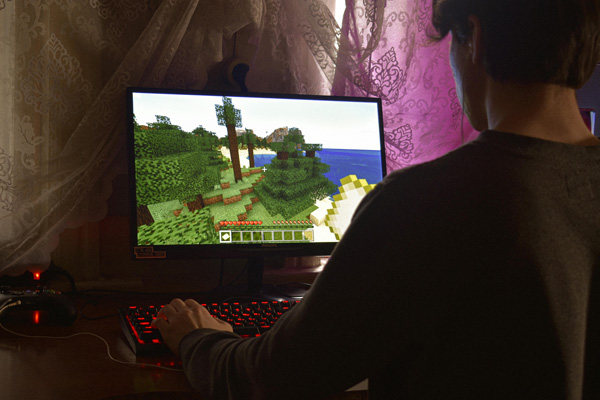Video games have become students' primary social spaces

[Flat screen computer monitor. Photo Credit to Pexels]
According to the Glimpse Gaming Trends Report 2025, "video gaming has become a top social activity for Gen Z and Gen Y, with nearly half of young adults reporting they made long-term friends while gaming and 40% of Gen Z and Millennials reported socializing more in video games than in person."
This finding demonstrates that teenage social interaction has undergone radical changes.
Gaming has become a central platform where students can build relationships that extend far beyond the virtual space.
Students, especially, are sustaining and strengthening friendships through collaborative gaming, which has created what many observers describe as a digital social transformation.
Moreover, the Pew Research Center's comprehensive study on video games and teen relationships found that "nearly eight-in-ten online-gaming teens (78%) say they feel more connected to existing friends they play games with."
The reason why contemporary gaming functions as a powerful social medium lies in its evolution from simple gameplay into a digital community.
Today’s students are not only competing with one another, but also collaborating content, attending virtual events, and participating in shared experiences comparable to those in face-to-face settings.
The level of engagement in these online spaces has reached a scale not seen before and appears to have reshaped how students spend their social time.
This matters because the social environment in which students grow is increasingly shaped by virtual platforms, raising questions about how schools and parents guide digital interaction.
Supporting this trend, Bain & Company's 2024 gaming survey discovered that "immersive gamers are more engaged, spending about one and a half hours more per week in the game compared with non-immersive gamers, with about one-third of that time spent on socializing, creating, and shopping rather than gameplay."
Popular games such as Fortnite, Minecraft, and Roblox have become a kind of virtual gathering place where students attend concerts, work on joint projects, and hold celebrations, creating alternatives to offline events.
Features such as voice chat, customizable avatars, and shared creative tools allow real social interactions to flourish in these spaces.
The social development of students is also affected due to how gaming offers certain special chances to shy or introverted students to gain confidence and practice communication skills in low-pressure settings.
Many report feeling comfortable communicating in games before applying those skills in real life.
However, this transformation also presents challenges.
Educators and parents must balance digital and physical social experiences.
As schools start embracing gaming as an acceptable social activity, some of them have introduced game-based learning and even esports programs to channel students’ enthusiasm for learning in constructive ways.
Evidence suggests that gaming is expanding, rather than replacing, traditional social connections.
These skills are proving useful in workplaces where collaboration increasingly depends on digital tools and remote communication.
This matters not only for how friendships are formed but also for how professional and civic life will operate in the years ahead.
Psychologists note that for students dealing with social anxiety, gaming can act as a stepping stone, enabling them to transition into more confident real-world interactions.
Online friendships often develop into in-person meetings, study groups, and lifelong bonds that begin in virtual spaces but carry into everyday life.
With the further development of gaming technology, including virtual reality and augmented reality options, the boundary between online and offline interaction is expected to grow even thinner.
For the next generation, gaming literacy is becoming an essential social skill, a development that will matter for education, work, and personal life alike.

- Alex Han / Grade 12 Session 3
- Thornhill Secondary School

![THE HERALD STUDENT REPORTERS [US]](/assets/images/logo_student_us.png)
![THE HERALD STUDENT REPORTERS [Canada]](/assets/images/logo_student_ca.png)
